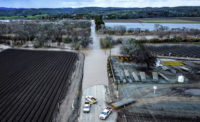After a marathon, nearly 10-hour public hearing, the California Coastal Commission voted unanimously on May 12 to deny a permit to Poseidon Water for the construction of a new desalination plant in Huntington Beach, Calif.
The vote brings to an end an odyssey that began more than two decades ago for Poseidon Water, which had attempted to meet the requirements of California’s coastal protection and other environmental laws to be able to build a desalination plant capable of producing 50 million gallons a day of drinking water in Orange County. Poseidon built a similar plant that went online in Carlsbad, Calif., in 2013.
D.J. Moore, an attorney for Poseidon, told the commissioners, “The need for this project is critical and without question.” After the vote, Poseidon put out a statement expressing disappointment. Jessica Jones, director of communications for the water project developer, said, “Every day, we see new calls for conservation as reservoir levels drop to dangerous lows. We firmly believe that this desalination project would have created a sustainable, drought-tolerant source of water for Orange County, just as it has for San Diego County.”
The Huntington Beach project had won the support of California’s governor, several local labor unions—including the Carpenters and the Orange County Labor Federation—and business groups such as the Orange County Business Council and the Black Chamber of Commerce. Moreover, local and state environmental agencies said that the project complied with the California Environmental Quality Act, Ocean Plan, Water Code and Public Trust Doctrine, according to Poseidon.
But in the end, that support was not enough. The project has been tremendously controversial, and the large public hearing room was crowded with opponents from environmental advocacy groups like Surfrider, Sunrise and the Sierra Club, as well as several tribal and environmental justice groups. They largely concurred with a recently released report by coastal commission staff that recommended a no vote on the project.
Commission staff at the hearing and other critics said that Poseidon’s proposals to mitigate the environmental impacts of the project were not fleshed-out or realistic, and that the energy needed to power the plant would make it harder for the state to meet emission reduction goals. They noted that some of the mitigation projects for the Carlsbad plant, which went online in 2013, only were permitted in 2019 and have not yet begun construction.
They also noted that the project design, which would rely on using cooling water from an adjacent power plant, runs counter to state regulations. Poseidon has contended that locating the project adjacent to an existing power plant on an industrial site would reduce the need for new infrastructure and reduce costs.
Several of the commissioners noted just prior to the vote that they were not against desalination as a solution to address climate change and related droughts, but that they opposed this particular project. Commissioner Steve Padilla noted that “The viability of desal is not before the commission.” What is before the commission, he said, was Poseidon’s application. The project “is problematic across the board. It’s unfortunate that there’s not a way forward,” he said.
Commissioner Dayna Bocho called for a state-wide plan to provide project developers some guidance on how to develop proposals for desalination projects that could meet state requirements and be able to move forward.
Chair Donne Browsey said she had not been certain how she would vote on the application until hearing from so many project opponents at the hearing. “We know we have major water problems in California. It’s going to take every tool in the toolbox, including intelligent desalination.” She added that “we need to get to the place where proposals that come before the commission have the support of all the diverse interests” – including project developers, labor unions, builders, environmental groups, the environmental justice community and tribes.





